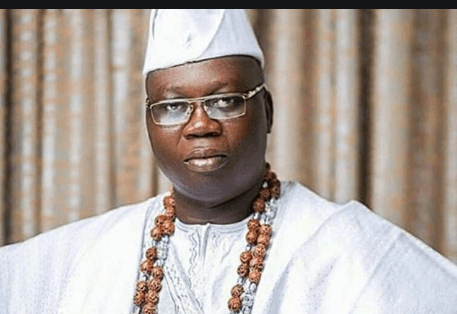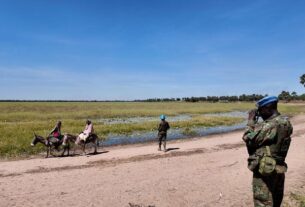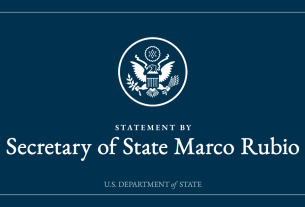Anayo Ezugwu
As Nigerians continued to express concern over dwindling government revenue, the Aare Onakakanfo of Yoruba land, Iba Gani Adams, has warn against unrestricted borrowings by the Federal Government, saying that it is a huge burden that has crippled the Nigerian economy. Speaking at the 2022 edition of Ajagunmale Festival in Lagos, Adams, who said Nigerians can feel hardship in all spheres of the nation’s economy, noted that the economic indices of the last quarter of the year have exposed the fragile situation of the Nigerian economy. His words: “With this obvious frailty in the Nigerian economy, we need not be told that the hard times are here. Nigerians are crying out loud and clear. The bad economy has stifled our neck and Nigerians can no longer breathe. Recently, the Debt Management Office (DMO) raised the alarm over the increasing debt profile of Nigeria. “The DMO added that Nigeria’s debt stock rose from N42.84 trillion in June to N44.06 trillion in September 2022. The total debt stock comprises the total domestic and external debt stock of the Federal Government, state governments and the Federal Capital Territory. Nigeria, Africa’s biggest economy has seen its debt rise by more than 100 per cent. “The DMO said increase in the debt was due to new borrowings by the Federal Government to finance a part of the deficit in the 2022 Appropriation Act. Unrestricted and huge borrowings have always been the bane of the Nigerian economy. To make things worse, the Federal Government had always looked for either aid or loans to solve its multifarious problems. The Federal Government had never tried to stand on its own feet. “I am not an economist or financial expert but as the Aareonakakanfo of Yoruba land, I agree with former Prime Minister of Pakistan, Imran Khan, who said no country with a begging bowl can become a great nation. Until the Federal Government reduces these unnecessary loans and borrowings, Nigeria might end up becoming a begging nation with little or no hope for the coming generations.” Adams, who advised the Federal Government to look beyond oil and gas in solving the country’s revenue crisis, said the tourism sector is a goldmine the Federal Government is yet to tap into. According to him, tourism is a major revenue earner all over the world and that the global community sees tourism as a major sector that attracts multiple rewards and gains. Noting that tourism has great potential to enhance the economy of Nigeria, Adams, however, regretted that Nigeria is yet to tap into this global resource. His words: “We have concentrated so much on oil and this has made Nigeria a nation that is solely dependent on oil. In my view, I believe tourism and the development of our various cultural infrastructures in Nigeria can provide better opportunities and prospects for Nigeria. “For instance, when we talk about cultural infrastructure, we talk about the buildings, structures and spaces where culture is consumed. We talk about places where culture is exhibited, experienced, showcased or sold to the world. “Places like museums, galleries, theatres, cinemas, libraries, record stores and historic cultural sites are our cultural infrastructures that need to be revived. These infrastructures can be turned into a goldmine. All over the world, the development of cultural infrastructure has been an essential component of great cities and should necessarily be a part of smart city initiatives. “I was in Brazil on an official visit and I returned to Nigeria at the weekend. My experience in Brazil was very exciting and rewarding. While in Brazil, I visited Museu Do Ipiranga in Sao Paulo. The museum is situated at the site where the late Ipiranga declared the independence of Brazil in 1888. It was the former presidential palace that was later renovated into a valuable museum and tourist centre. “This is to show how Heritage structures like that are important aspects of cultural infrastructure in Brazil. We can learn from the Brazilian experience. Nigeria should know that there are several ways through which cultural heritage can be assimilated as part of smart city projects. Investment in cultural infrastructure can also help the government in developing an environment that is conducive to creativity. “It is also an opportunity to create employment in traditional and cultural industries. Cultural infrastructure is a key part of creating great places that bring people together, great places to live, work, visit and do business. I believe that the implementation of this policy in Nigeria, and even in the South- West has clear economic, social and cultural dimensions and advantages for the region. “Despite the high financial cost implications, it offers numerous benefits for the citizens and the nation in general. Meanwhile, the adoption of laws that support culture will give protection to citizens and also create a viable market for those in the arts business. I think it was time for South-West governors to look into this. They should see it as a better opportunity and means to sustain the various Yoruba cultural heritage and infrastructures that spread across the region.”
TRY IT TONIGHT!!! —
Abuja Civil Servant reveals (FREE) secret Fruits that Increased his Manh0d size, gives Stronger Erections and ends Premature Erection in 7days…
Related



